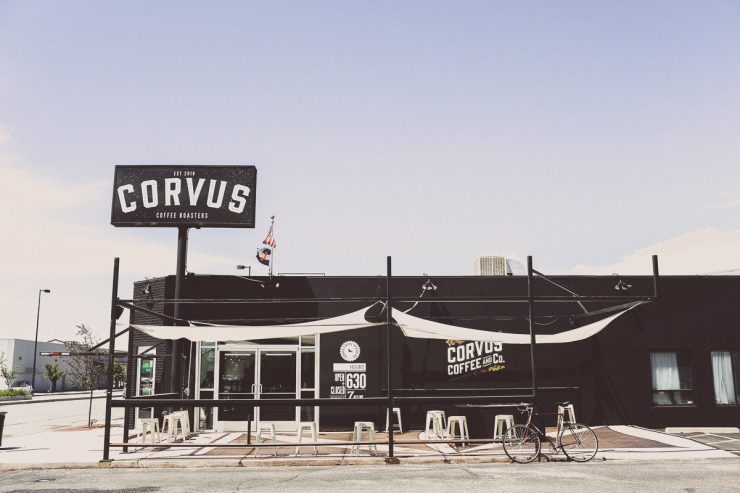
Denver may just be the next great coffee city in America. It’s a bold claim, but not an unreasonable one. Denver is a young city, and it’s one of the fastest growing in the US, two things that generally bode well for any budding cultural phenomenon. Thanks to the surfeit of craft microbrews—more than 50 in the metropolitan area—Denver already has a history of, and an appreciation for, the artisan, local, and unique.
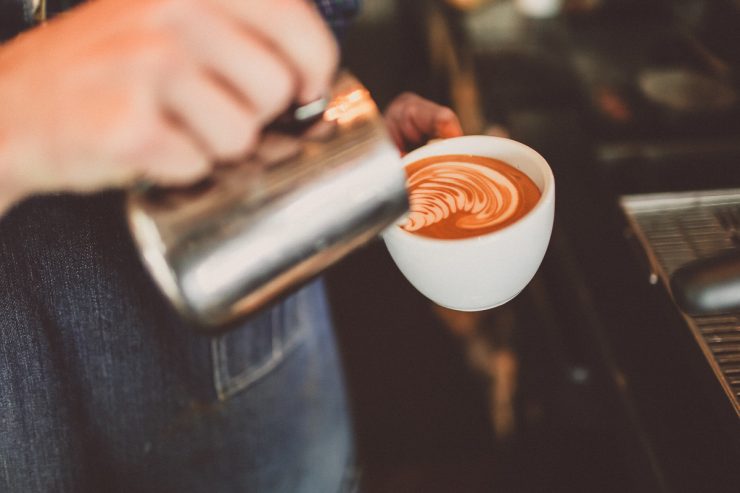
But such grandiose predictions of “next big thing”-ness aren’t based solely on social sabermetrics or Tasseographical jiggery-pokery, but on empirical data. And no stat is more telling than the number of nationally renowned roasters that call the Mile High City home. One such star in the Denver specialty constellation is Corvus Coffee Roasters, who through thoughtful design and a progressive approach to sourcing have positioned themselves as one of the leading cafe-roasters in Denver.
Located along the 1700 block of South Broadway—the dividing line between the Overland and Platt Park neighborhoods—sits the Corvus roastery and cafe, their base of operations since January 2014. The matte black and white trim corner building standing in stark contrast to the surrounding businesses’ ruddy brick exteriors.
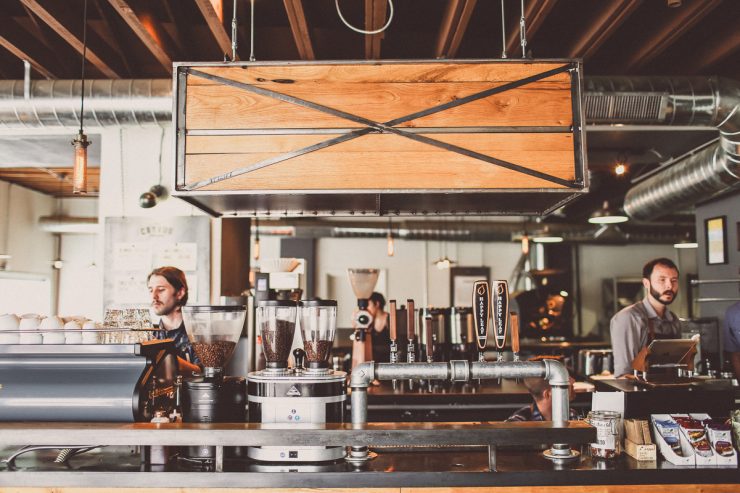
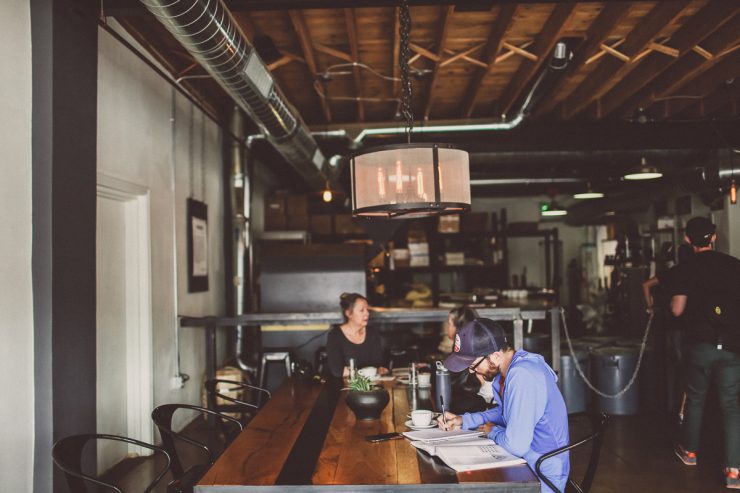
Inside, the industrial bones of the 2,200-square-foot space—its warehouse-like openness, polished concrete floors, and exposed ductwork—inform much of the design aesthetic, but have been softened a bit with the addition of warm wood tones throughout. The formula for this amalgam of wood and steel fluctuates as you move through the building from front to back, the warm woody-heavy cafe gives way to the more austere, steel-laden roasting area, where a formidable-looking matte black Giesen 15-kilo roaster anchors the space. A host of wood and steel communal tables and standing bars populate both portions of the building, blending the two halves into a cohesive whole.
At the midpoint is Corvus’s U-shaped coffee bar, the nucleus around which the rest of the space revolves. Equal parts industry and warmth, the coffee bar consists of welded blue steel countertops resting atop a base of honey-color stained white oak panels.
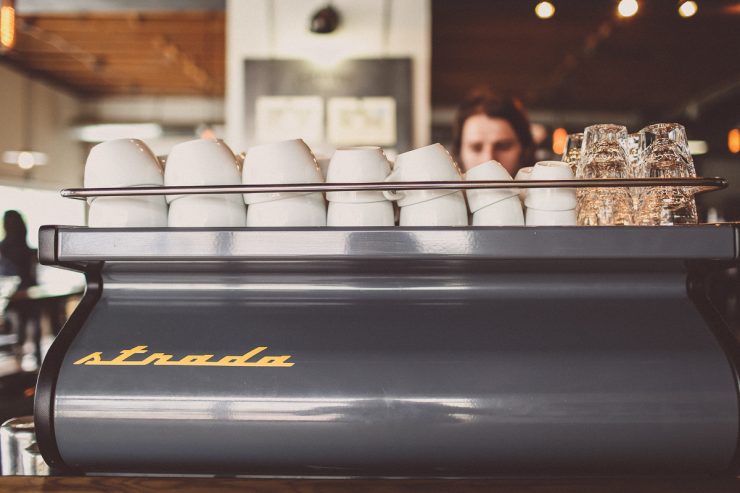
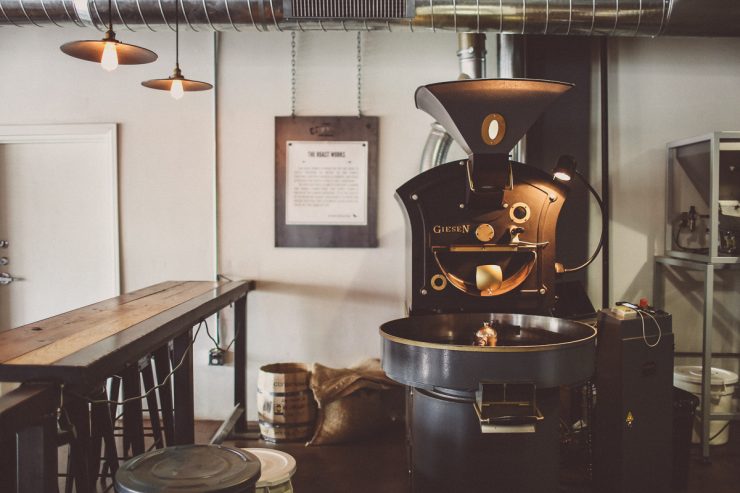
Standing front and center on the cafe-side coffee bar is the monochromed-out espresso program. A grey two-group La Marzocco Strada MP anchors the program, aided by a black Mahlkönig K30 and a silver Mahlkönig K30 Twin espresso grinder. During my visit, Corvus was serving Tre Bukken—a blend of three different processes (washed, natural, and honeyed) of the same single-origin Peru from Finca Tasta—and a Guatemala Familia Bonilla decaf. The pour-over bar offers V60, Chemex, AeroPress, and French press, all rotating on a regular basis, employing a copper-toned Mahlkönig EK 43 for all pour-over and batch brew coffee.
Beyond their regular menu, Corvus offers a variety of experimental coffee beverages with interesting flavor profiles. Drinks like their handmade almond-cashew milk cappuccino and cascara lemongrass latte offer a fun change of pace to regular espresso-and-milk status quo, but none of Corvus’s left-of-center concoctions is more popular than their dry-hopped nitro cold brew on tap, a drink that has recently garnered national attention and for good reason. The mix of the velvety nitro texture and the lively flavor profile thanks to the hops creates a lighter, more fruit-forward beverage than traditional cold brew; it’s the perfect summertime sipper.
Owner Phil Goodlaxson says the dry-hopped idea came from where else but beer (this is Denver after all). “We were doing a lot of beer events and wanted to serve something a little more ‘beer-y’. So we threw some hops in some cold brew and made a couple hundred hand-stamped bottles. It wasn’t as good as it is today—it’s been a long learning curve—but it was a lot of fun and has led to several other cold brew products, most recently a top-secret test batch of whiskey cold brew.”
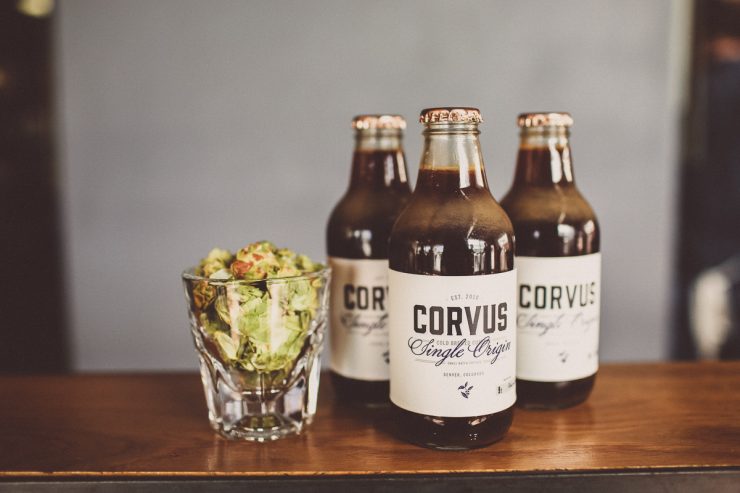
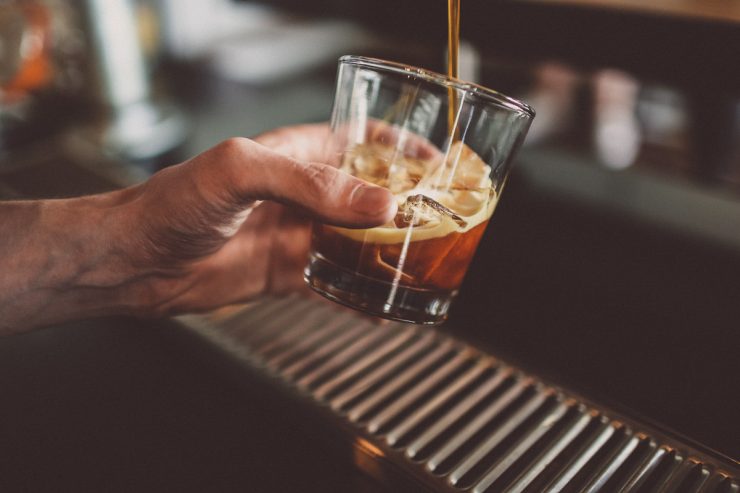
Corvus also brings a forward-thinking approach to roasting and sourcing. Through a handful of origin trips and direct trade relationships, Goodlaxson has been able to acquire quite a few coffees that go through a variety of progressive farm-level practices. Their La Mision coffee from Colombia, for instance, goes through a pre-fermentation process that promotes the formation of lactic and acetic acids, changing the coffee’s acidity and mouthfeel. Their Costa Rica La Cruz is double-washed, a traditionally Kenyan processing method. “It cupped with a lot of the starchy notes you’d expect from really high-end Kenyans,” Goodlaxson stated. “These [various processing methods] are interesting to me because they keep a lot of innovation going at the farm level.”
It’s pretty easy to see why Corvus is one of the big players in Denver’s coffee takeover. Their willingness to experiment with all aspects of the coffee-making process is akin to the craft brewers that surround them, a move that no doubt plays well in their neck of the woods. And they are approachable. Even with their predilection for intriguingly processed coffees, Corvus is very much a neighborhood-friendly shop, removing any barrier of entry for the specialty-coffee-curious. Which is good. If Denver is going to live up to the, perhaps, brash claims made earlier, they are going to need as many Third Wave converts as they can. Your move, Denver.
Corvus Coffee is located at 1740 South Broadway, Denver, Colorado. Follow them on Facebook, Google+, Instagram, and Twitter, and visit their official website.
Zac Cadwalader is a Sprudge.com staff writer based in Dallas. Read more Zac Cadwalader on Sprudge.
Photos by Caitlin Fairly.
The post Denver: Corvus Coffee Leads The Way In A City-Wide Boom appeared first on Sprudge.

